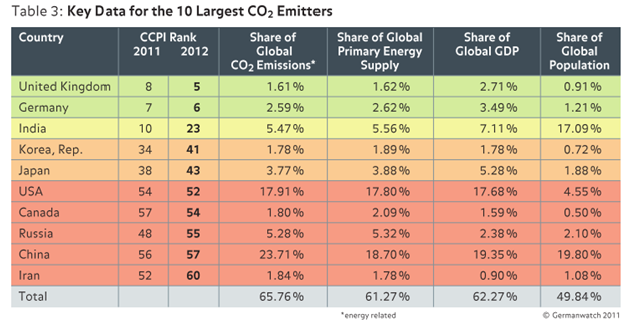Sweden, the U.K., and Germany: The European trio leads the world in fighting climate change.
That’s the finding of the most recent Climate Change Performance Index [PDF], which was released yesterday at COP 17 in Durban. But Swedes, Brits, and Germans shouldn’t cheer just yet; even their countries are not contributing their fair share.
In fact, that is the most worrying result of the index: No country is doing enough to seriously fight climate change. Consequently, the report — published by Germanwatch and Climate Action Network Europe — did not reward any country a ranking of 1-3. The countries ranked worst this year are Saudi Arabia, Iran, and Kazakhstan.
What about the United States? In comparison to 2010, the U.S. has climbed up two ranks, mainly due to emission reductions from the recession and increased renewable energy capacity. However, given still-high emissions and the lack of substantial national policies, the U.S. remains toward the bottom of the index, ranked No. 52. Among the large emitters around the world, only Canada, Russia, China, and Iran are worse.

China is a particularly interesting case, with a somewhat contradictory performance. While it remains the world’s largest CO2 emitter (in absolute, not per-capita, terms) and its emissions continue to grow dramatically, its attempts to curb domestic emissions are intensifying, with binding energy-intensity targets and renewable-portfolio requirements. In just a few years, these top-of-the-class policy efforts will influence its emission trajectory.
This is how the index works:
On the basis of standardized criteria, the index evaluates and compares the climate protection performance of 58 countries that are, together, responsible for more than 90 percent of global energy-related CO2 emissions. 80 percent of the evaluation is based on objective indicators of emissions trend and emissions level (50 percent for emissions trend, 30 percent for emissions level). 20 percent of the index results are built upon national and international climate policy assessments by more than 200 experts from the respective countries.
Meanwhile, at the Durban climate talks, the U.S. is pushing an alarming proposal to lock in a 10-year timeout, with no new targets to lower emissions until 2020. If it succeeds, by all rights it should plunge to the bottom of the Climate Change Performance Index and stay there.



